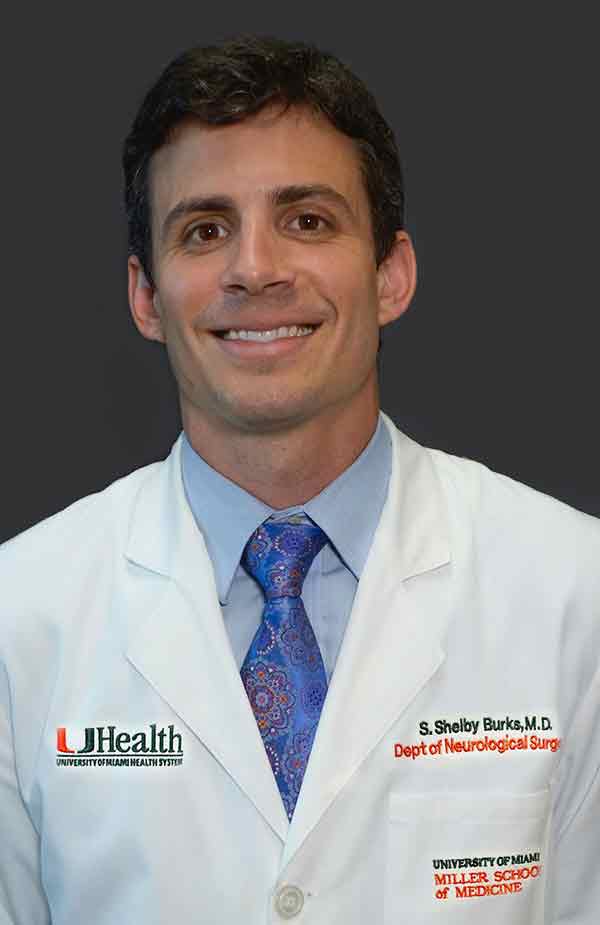What is a Herniated Disc?
When the outer ring of an intervertebral disc tears or ruptures, it can result in a herniated disc. These cartilaginous structures connect spinal vertebrae, and the tear causes the centre of the disc to protrude outward, potentially impinging on nearby nerves. Although a herniated disc can occur in any intervertebral disc, most cases occur in the lumbar region.
With decades of experience treating patients similar to yourself, Dr. Shelby Burks is providing tailored treatments to meet your specific needs. You can reach our spine surgery centre in Miami for a herniated disc consultation.
Causes of Herniated Disk
Herniated discs are a common condition among young and middle-aged adults. There are a few factors that may increase one’s vulnerability to disc herniation. These include:
Intense, excessive force to the spine (this may be sudden falling or collision injuries)
- Obesity
- Lack of regular exercise
- Excess use of tobacco
- Incorrect and/or repetitive lifting or twisting
- Drying out of discs, loss of strength, and resiliency due to aging
Symptoms of a Herniated Disk
The major symptom of this condition is pain, which mainly occurs on one side of the body. Symptoms vary, depending on the site of injury, and may include the following:
- Sharp pain in one part of the leg, hip, or buttocks, and numbness in other parts.
- Pain or numbness on the back of the calf or sole.
- Weakness in the leg.
Symptoms of a herniated disk in the neck
- Pain while moving the neck
- Deep pain near or over the shoulder blade.
- Pain travels to the upper arm, forearm, and fingers.
- Numbness along the shoulder, elbow, forearm, and fingers.
- Pain starts slowly and gets worse after sitting, standing, or at night.
- Pain worsens at night.
- Pain intensifies when sneezing, coughing, laughing, bending backwards, or walking over a few yards or meters.
Other Symptoms
- Pain when straining or holding your breath (during a bowel movement)
- Weakness in certain muscles
- Difficulty lifting a leg or an arm
- Standing on one side
- Squeezing tightly with one hand
- Loss of bladder control
Diagnosing Your Herniated Disc
If you experience back pain, particularly after heavy lifting or an accident, it’s essential to seek the attention of a specialist in herniated discs. Such symptoms can be indicative of a herniated disc, which may be accompanied by the following symptoms:
- Pain in the back, leg, foot, and arm
- Numbness in the leg
- Muscle spasms
- Stiffness neck
- Pain, burning, pins and needle sensations
When you visit a spine specialist for back pain, they will begin with a physical examination to assess your medical history, posture, range of motion, and other physical indicators. In certain instances, an X-ray, MRI, or CT scan may be required to diagnose the underlying cause of your herniated disc. At Burks Neuro Spine Surgery Center in Miami, we offer imaging services to accurately diagnose your condition and determine the most appropriate treatment options.
Prevention Methods
Since abdominal muscles are responsible for supporting the vertebrae, doing exercises that focus on strengthening the abdominals can help. These exercises will add more stability to the spine. Regular exercise can prevent a disc from herniating. These are also helpful in preventing a herniated disc from worsening or recurring.
One of the major risks of a herniated disc is being overweight. Hence, it is important to maintain a healthy body weight. Lifting heavy items in poor form can also contribute to the condition. Doctors advise bending your knees when lifting anything.
Treatment Options
The line of treatment for a herniated disc may vary. It depends on a variety of factors, including the severity of the condition and the patient’s unique circumstances.
Self-care: This is the most recommended option for minor injuries or herniations. Patients are advised to take ample rest to allow the area to relax.
Medications: It is also a common treatment option. Doctors usually prescribe anti-inflammatory drugs to provide relief from pain.
Stretch: Mindful stretching is important to ensure ample flexibility in the area.
Physical Therapy: It is advised for complicated injuries.
Medical Procedure: Sometimes treatment may include therapeutic ultrasound or epidural injections.
Surgery: This is suggested for the most severe cases where none of the conventional methods have worked.
Best Doctor for Herniated Disc Treatment in Miami
Are you suffering from disc herniation? Burks Neuro Spine Surgery’s Center for Comprehensive Spine Care can help. Dr. Shelby Burks will diagnose a slipped disc and recommend the proper course of action. If needed, he can provide advanced herniated disc treatments in Miami, such as minimally invasive herniated disc surgery.

